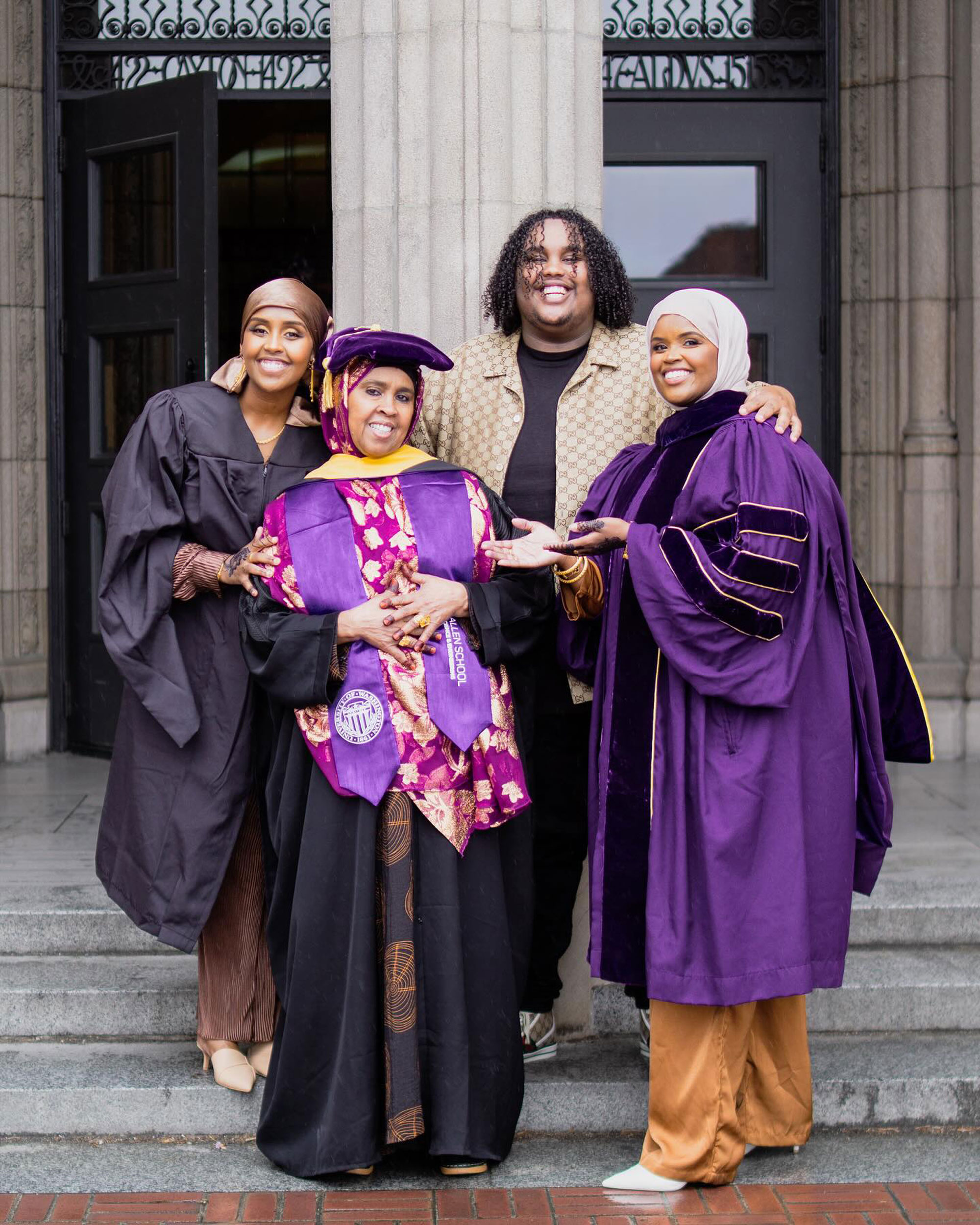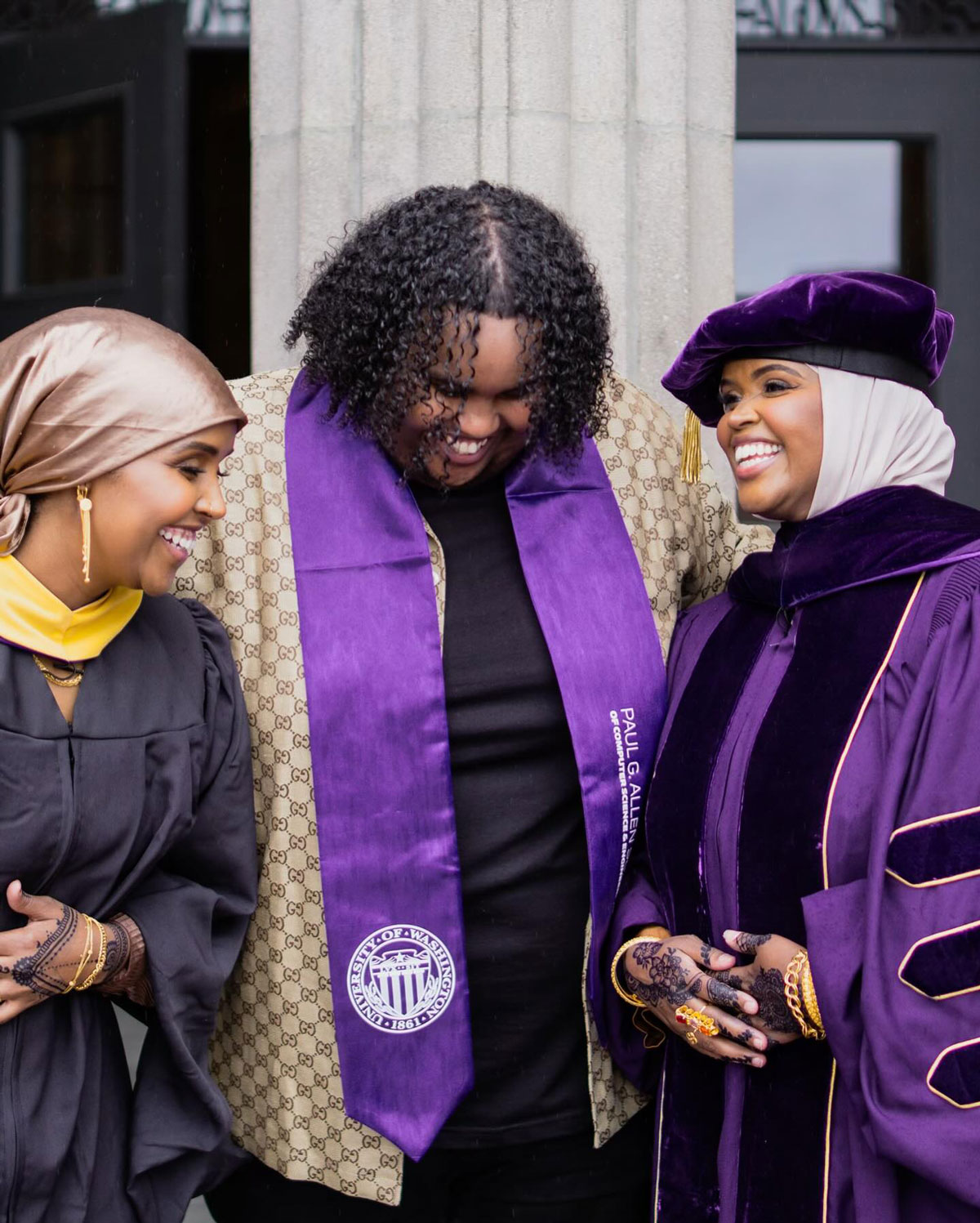
Big sister leads the way Big sister leads the way Big sister leads the way
Asha Warsame succeeded despite a lack of resources. Now equipped with her Ph.D., she's improving the system for others.
By Caitlin Klask | Photos by Muzammil Siddiqee | Viewpoint Magazine
Asha Warsame was a child refugee who experienced war and famine before the age of 5. When she was in middle school, her family had settled in South Seattle, but she commuted across the city to Wallingford to attend Hamilton International Middle School because her mother had heard it was a good place for children trying to adapt to a new country, language and culture.
“When your family is not familiar to the area, [you are] trying to figure out how to navigate the spaces you’re in while lacking resources,” says Warsame, who is one of eight children in a single-parent family from Somalia. Her memories of middle school are foggy; while her classmates were learning new subjects, she and her family were adjusting to their new surroundings with few resources.
Today, Warsame—a first-generation college student who capped her UW bachelor’s and master’s degrees with a doctorate in education in June—hopes to develop more resources and representation for young people who might not see college as a possibility. As a scholar, she led the way for her younger siblings, Ayan Warsame, ’21, ’24, and Abdi Najim Aban, ’24. All three graduated on the same spring day—Ayan with a master’s in social work and Abdi, a computer science degree.

Asha Warsame, right, celebrates with her siblings Abdi Najim Aban (center) and Ayan Warsame (left) after all three graduated this June.
“The UW is a prestigious school, especially among the Somali community,” says Warsame, explaining what drew her and her sister and brother to their alma mater. “I figured out the process, and that made it seem like it’s possible” for her younger siblings.
Warsame’s decision to attend the UW stemmed from her participation in a set of challenging high school courses meant to prepare students for college and global engagement. She began learning Arabic, which brought her, as a high school freshman, to OneWorld Now!, a Seattle-based extracurricular program for high school juniors and seniors who want to learn a new language and travel abroad.
Asha led the way for her younger siblings, Ayan Warsame, ’21, ’24, and Abdi Najim Aban, ’24. All three graduated on the same spring day—Ayan with a master’s in social work and Abdi, a computer science degree.
With help from Greg Wong, ’07, her supervisor at a youth tutoring program, she persuaded the OneWorld Now! coordinators to make an exception and accept a younger student. She ended up in Morocco studying Arabic. While in North Africa, she met a group of Fulbright students studying and conducting research. “And I’m like, ‘That’s what I want to do,’” she says. So she applied to the UW with dreams of becoming a scholar.
When she started at the University, Warsame found only six other Somali students in her class. She joined the Somali Student Association, an organization based out of the Kelly Ethnic Cultural Center and focused on spreading knowledge and understanding of Somali culture, mentoring students and increasing the enrollment of students of East African descent.
At first, Warsame struggled with her decision to go pre-med. “My GPA was suffering, and I was like, ‘Asha, this is not it,’” she says. Her mother was supportive. “She said, ‘You have to do what you’re interested in and what’s going to work best for you.’ And I said, ‘Well, I’m interested in becoming a teacher.’”
Warsame finished her bachelor’s degree in 2012, took a job at Cultivate Learning, a UW research center focused on early childhood education, and applied to graduate school. She wasn’t accepted the first time. “There’s a reason why everything happens,” she says. “It puts perspective back into things. I was able to apply again the following year, and that’s when I got in.”
In graduate school, Warsame relished learning with and from people with similar lived experience. “When I was taking graduate non-matricular courses, it brought me into the space of learning about myself, my earlier experiences.” Some of her courses brought up memories from her childhood as she was learning English. The education system, she realized, lacked a cross-cultural approach. “I thought, ‘That’s why I struggled with this,’” she says.
Wong, now Seattle’s deputy mayor, also recognizes this gap and is proud to play a role in bridging it. “In general, when we think about what helps make us as a society and a city thrive, it’s the ability to give young people who may have come from uncertainty some structure to support them, to help them visualize and achieve their goals,” he says. “The investment pays off in later years, as Asha found. These people become amazing contributors to our city in a way that is 100% worth the investment of our time.”